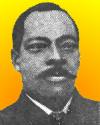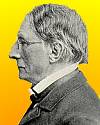 | TODAY IN SCIENCE HISTORY NEWSLETTER - 23 APRIL |
| Feature for Today |
 On 23 Apr 1856, Granville T. Woods was born, oustanding as a prolific inventor. For holding more patents than any other African-American in his era, he has been called "the Black Edison." On 23 Apr 1856, Granville T. Woods was born, oustanding as a prolific inventor. For holding more patents than any other African-American in his era, he has been called "the Black Edison."In his book Men of Mark: Eminent, Progressive and Rising, author Rev. William J. Simmons, while President of the State University, Louisville, Kentucky, in 1887, profiled dozens of notable African-Americans in tribute to their "intellectual vigor." Simmons was himself a former slave, a soldier in the Union Army during the Civil War (1864-65), as well as a journalist. Though moderate, Simmons was progressive politically, and worked pragmatically within the strictures of segregation to benefit African-Americans. Had he not died suddenly of a heart attack at the early age of 41 (in 1890) while he was nearing national recognition from his writings, he might have been as well-remembered as, for example, Booker T. Washington. Simmons' chapter on Granville T. Woods includes several quotes from contemporary newspapers recognizing the importance of Woods' devices invented for the safety of railways and street-cars. As you read this chapter, you will be introduced to two notable 19th-century African-Americans: one you know, Granville Woods, but also the author, William Simmons. |
| Book of the Day | |
| |
| Quotations for Today | |
 | "An experiment is a question which science poses to Nature, and a measurement is the recording of Nature's answer." |
 | "For the first time there was constructed with this machine [locomotive engine] a self-acting mechanism in which the interplay of forces took shape transparently enough to discern the connection between the heat generated and the motion produced. The great puzzle of the vital force was also immediately solved for the physiologist in that it became evident that it is more than a mere poetic comparison when one conceives of the coal as the food of the locomotive and the combustion as the basis for its life." |
| "The chemists who uphold dualism are far from being agreed among themselves; nevertheless, all of them in maintaining their opinion, rely upon the phenomena of chemical reactions. For a long time the uncertainty of this method has been pointed out: it has been shown repeatedly, that the atoms put into movement during a reaction take at that time a new arrangement, and that it is impossible to deduce the old arrangement from the new one. It is as if, in the middle of a game of chess, after the disarrangement of all the pieces, one of the players should wish, from the inspection of the new place occupied by each piece, to determine that which it originally occupied." | |
| QUIZ | |
| Before you look at today's web page, see if you can answer some of these questions about the events that happened on this day. Some of the names are very familiar. Others will likely stump you. Tickle your curiosity with these questions, then check your answers on today's web page. | |
| Births | |
 |  Max Planck, born 23 Apr 1858, was a German theoretical physicist who was awarded the Nobel Prize for Physics in 1918 for his quantum theory. This assumes that energy is not infinitely subdivisible, but ultimately exists as discrete amounts he called quanta. Further, the energy carried by a quantum depends in direct proportion to the frequency of its source radiation. Max Planck, born 23 Apr 1858, was a German theoretical physicist who was awarded the Nobel Prize for Physics in 1918 for his quantum theory. This assumes that energy is not infinitely subdivisible, but ultimately exists as discrete amounts he called quanta. Further, the energy carried by a quantum depends in direct proportion to the frequency of its source radiation. The word quanta comes from a Latin word which has what meaning? The word quanta comes from a Latin word which has what meaning? |
| Deaths | |
 |  Max von Laue (1879-1960) was German recipient of the Nobel Prize for Physics in 1914 for his investigation of crystals with X-rays, which enabled scientists to study the structure of crystals. Max von Laue (1879-1960) was German recipient of the Nobel Prize for Physics in 1914 for his investigation of crystals with X-rays, which enabled scientists to study the structure of crystals. What effect on the X-rays by the crystals did he observe? What effect on the X-rays by the crystals did he observe? |
| Events | |
 On 23 Apr 1981, an artificial transplant was first made in the U.S. on patients at Massachussetts General Hospital, Boston. The transplant material was a combination of cowhide, shark cartilage and plastic. On 23 Apr 1981, an artificial transplant was first made in the U.S. on patients at Massachussetts General Hospital, Boston. The transplant material was a combination of cowhide, shark cartilage and plastic.  What was the purpose of the transplant? What was the purpose of the transplant? | |
 On 23 Apr 1962, the American satellite Ranger IV, was launched from Cape Canaveral, Florida, which became the first to accomplish a certain mission. On 23 Apr 1962, the American satellite Ranger IV, was launched from Cape Canaveral, Florida, which became the first to accomplish a certain mission.  What was the mission of Ranger IV? What was the mission of Ranger IV? | |
 On 23 Apr 1867, the Zoetrope was patented in the U.S. The device was the first animated picture machine. On 23 Apr 1867, the Zoetrope was patented in the U.S. The device was the first animated picture machine.  How did the Zeotrope function to produce an animated picture? How did the Zeotrope function to produce an animated picture? | |
| Answers |
When you have your answers ready to all the questions above, you'll find all the information to check them, and more, on the April 23 web page of Today in Science History. Or, try this link first for just the brief answers. Fast answers for the previous newsletter for April 22: Robert Oppenheimer; electric storage battery; harnessing steam at much higher pressures than before; the decade including the year 1970; layers of metal forming the body of the lock instead of a stamped shell. |
| Feedback |
 If you enjoy this newsletter, the website, or wish to offer encouragement or ideas, please send feedback by using your mail reader Reply button. If you enjoy this newsletter, the website, or wish to offer encouragement or ideas, please send feedback by using your mail reader Reply button. |
--
If you do not want to receive any more newsletters, this link
To update your preferences and to unsubscribe visit this link
If you do not want to receive any more newsletters, this link
To update your preferences and to unsubscribe visit this link
! !



Δεν υπάρχουν σχόλια:
Δημοσίευση σχολίου